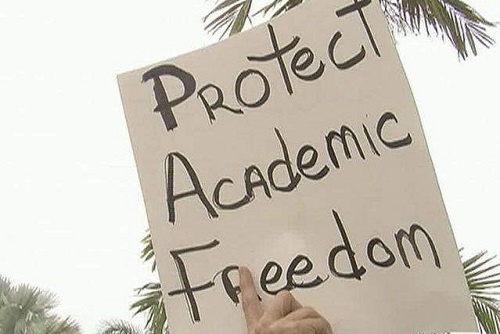By
Fanuel Lakew
Most of the time, academic freedom is defined as an activity in educational institutions where teachers or scholars and students engage in an intellectual debate without any fear of censorship. It also gives freedom for teachers and students to study, research and pursue knowledge with no unreasonable restriction from various external bodies such as government, law enforcement and the public at large. According to Universities Affairs magazine of Canada, academic freedom is one of the pillars of the modern university, and yet it is a comparatively new concept.
Albert Einstein once said: “By academic freedom, I understand the right to search for truth and to publish and teach what one holds to be true.” The presence of academic freedom helps a country build a democratic system, produce problem-solving researchers, and most importantly, have universities that are critical incubators. Various scholars say that academic freedom in Ethiopia is not in a good position as an external body, like the government, unreasonably intervenes in academic affairs.
Thus, many faculty members, including this reporter approached with, argue that academic freedom has to be ensured to protect intellectual integrity in higher institutions and serve the public good. The rights of faculty members and students must be protected from an act of retaliation for challenging or disagreeing with policies. They also need to have space and the right to argue and challenge one another’s views.
Similarly, they have responsibilities as well. Academic freedom doesn’t mean that university lecturers can threaten or impose their views on students. It also doesn’t protect students or teachers from disciplinary action, professional misconduct and investigations into allegations of scientific misconduct. Rights and responsibilities go hand in hand.
Bisrat Teklu, Counselor and Law Lecturer at the Ethiopian Civil Service University, stated that historically there was academic freedom during the monarchical system of Haile-Selassie. However, he said that academic freedom was shrunk and stifled when the military junta—Derg—came to power and the same was true for the Ethiopian People’s Revolutionary Front (EPRDF) regime.
Assistant Prof of Law at Hawassa University, Tadesse Melaku, on his part noted that academic freedom is somewhere between ‘being free’ and ‘not free’. The presence of academic freedom is important to come up with new ideas to the society which are problem-solving, he says. In this regard, the Ethiopian Constitution, under Article 29, guarantees right of thought, opinion, and expression. It also states that everyone has the right to hold opinions without interference.
While the constitution guarantees the aforementioned right, higher educational institutions have an affiliation with the doctrine of the ruling party, Tadesse noted, saying that it was difficult for universities to come up with ideas, entertain views and become critical incubators. “Educational institutions are supposed to be free from any political and religious issue and act independently and freely.”
In reality, Tadesse further noted that the ruling party elements are organized to see after every activity of students and faculty members. As a result, ideas are not entertained, tabled and criticized. He also said that there is an up-down flow of ideas, training and information in the universities, which is contrary to the principles of academic freedom. “Faculty members and employees don’t have the right to elect their own leaders at universities as the government does it appointing its own politically loyal people. This is contrary to the objective of universities, not healthy to build a democratic system and difficult to have accountable leadership.”
Whereas, Bisrat seconds Tadesse’s stance saying, in the former institutions he used to teach at, the ruling party affiliated elements scrutinize the activity and even the ideas entertained in the class. In other words, the government has an upper hand in the universities which can cripple academic freedom. This move makes teachers and students afraid of participating in idea creation and sharing platforms. This really affects the learning-teaching process. Universities’ administrations are working to show their political loyalty to the ruling party rather than promoting academic freedom, he added.
Furthermore, Prof. Tadesse pointed out that to redress the threats the government should enact policies and frameworks that would help create an inspired vision and a workable environment and ensure academic freedom. “Universities’ leaders should be elected by the community, and their accountability should be to the community as well. Besides this, faculty members and students have a moral obligation to be active participants in true scholars and innovators and building a democratic system.” Teachers’ associations also need to be reformed making them independent and free from any political motives, he underscored.
Bisrat agreed with Tadesse as he argued that higher educational institutions should be led by well-qualified scholars and educated people and nomination for leadership positions needed to be on the basis of meritocracy. Faculty members and students also have to exercise their rights responsibly and not abuse the ongoing political change and academic freedom. The government on its part is expected to facilitate in setting up a better platform that would assist university lecturers to publish journals, articles, and research works, Bisrat said.
All in all, addressing the problems of academic freedom is quite important, not only to academicians but also to everyone. It is because faculty members will enjoy the unrestricted expression of opinions. At the same time, opinions that come out of universities will ultimately benefit the public at large. Research works can heal the wounds of society. To meet all these ends, academic freedom must be protected and ensured in higher educational institutions.
Fanuel Lakew
Fanuel Lakew is a reporter at the Ethiopian Herald Newspaper of the Ethiopian Press Agency. He did his B.A. degree in Political Science and International Relations from Addis Ababa University in 2012. He also served as the Secretary-General of the Ethiopian Political Science and International Relations. He as well studied M.A. in Politics and International Relations at the Central University of Gujarat, India. He can be reached at [email protected]



No Comments Yet!
You can be first to comment this post!